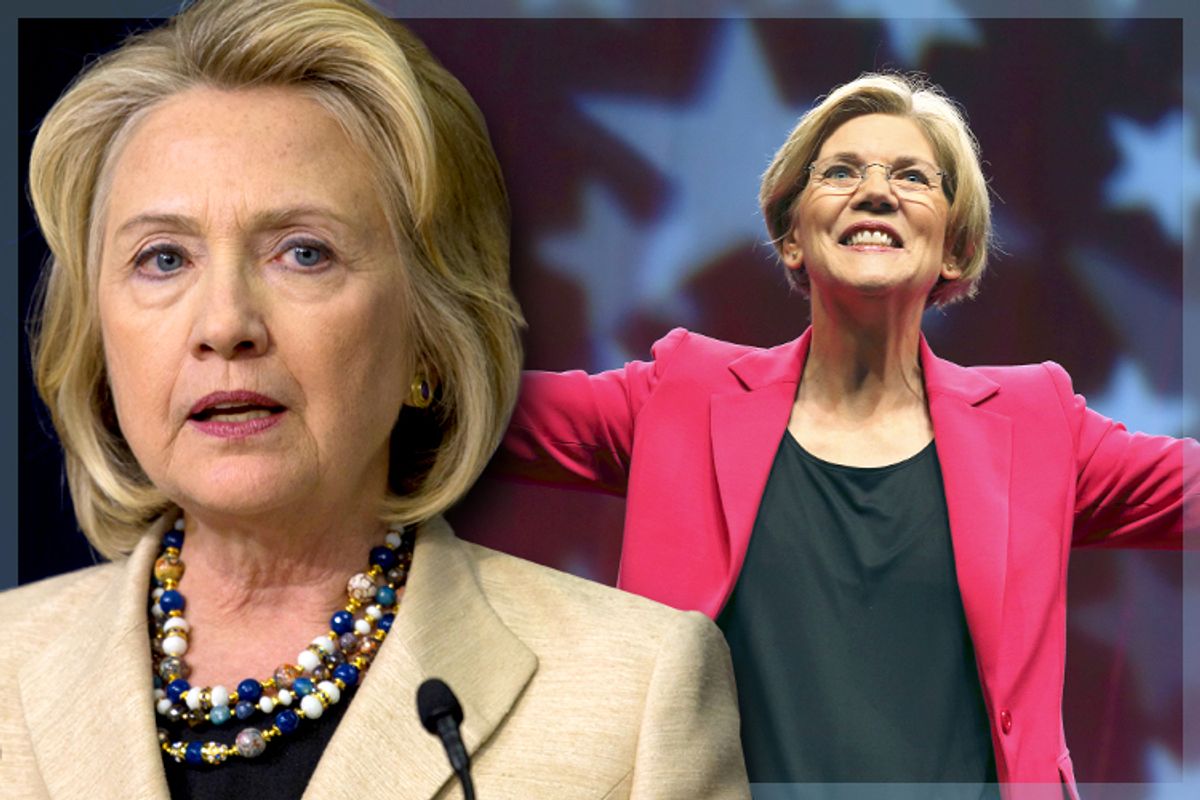Let me be clear: I’m Ready for Hillary – and for Elizabeth Warren, too. I think a 2016 Democratic presidential primary process that featured both women would be epic. I don’t expect to see it, but I don’t think it’s a disastrous prospect, a terrific idea or impossible. It’s November 2013. Almost anything can happen.
What interests me right now is the outsize reaction to Noam Scheiber’s New Republic piece on Warren as “Hillary’s nightmare.” It makes me think about something I realized back when disgruntled progressives were (briefly) making fretful noises about needing to find someone to challenge President Obama in a primary. Progressives are just way too invested in using the primary process every four years to get the country to take big leaps forward that probably could be better pursued in other ways.
I think Scheiber is absolutely right that Clinton’s biggest potential flaw is her association with the Wall Street wing of the Democratic primary. I wrote about that in September. And I’m even less Ready for Hillary since it was announced she’s giving top-dollar speeches to Goldman Sachs and the Carlyle Group. Her association with the Clinton Foundation already makes her too close to plutocracy for my comfort.
I also agree with Scheiber that economic populism and income inequality are big, under-tapped issues that could drive the Democratic base. Some writers have gotten tied up in arguing that Warren won’t run, because that’s what she’s said, or that she can’t win even if she does. As I read Scheiber, all he’s saying is that Warren’s sense of her own economic and political mission is so strong that if she feels those issues aren’t being adequately addressed in the 2016 campaign, she just might jump in. I can’t really argue with that.
But the huge reaction to Scheiber’s piece just reminds me that ever since Sen. Ted Kennedy’s 1980 primary challenge to Jimmy Carter – maybe since Gene McCarthy’s insurgency, followed by Bobby Kennedy’s, convinced Lyndon Johnson not to seek reelection in 1968 – progressives have been over-invested in finding a primary campaign vehicle for their hopes and dreams. And until Barack Obama came along, that hadn’t worked out very well.
Even Obama’s emergence is a cautionary tale for Warren backers, because I’d argue that investing the freshman Illinois senator with magic progressive properties was a bad bet. He was never more progressive, ironically, than Hillary Clinton, except maybe on Iraq – and his national security policies can’t make any of his antiwar, pro-civil liberties backers comfortable that they did the right thing.
Obama was also the only insurgent in the 40 years since Bobby Kennedy died who was able to bring along the party’s black and brown voter base. Ironically, this time it’s Clinton who would marshal the same electoral muscle against Warren, whose candidacy is so far the fondest dream of young white male progressive pundits (not that there’s anything wrong with that). That doesn’t mean Warren couldn’t win those groups over, or that Clinton can’t lose them – she certainly lost African-Americans in 2008, though it’s hard to compare Warren’s potential appeal to Obama’s.
Still: A lot can change, and I’m uncomfortable with arguments from the left or the right that the allegiance of African-American and Latino voters is mainly a matter of legacy or identity, and not self-interest. If Hillary Clinton were to wage a Wall Street-friendly campaign of inevitability, expecting a “Ready for Hillary” primary coronation and not a campaign, I would hope that progressive African-American and Latino and women voters would desert her in droves. But I don’t expect her to do that. Is a primary challenge from someone like Warren the only way to make sure she doesn’t? I don’t think it is.
I also worry that transforming Warren from a freshman senator with an admirable, ambitious and crucial agenda of financial regulation and economic equity into a presidential candidate potentially hurts Warren, as well as her agenda. Working her legislative priorities in the glare of the global presidential media spotlight will at least change, if not thwart, her priorities.
Meanwhile, 2014 looms, and as I argued in 2010: The best way to get a more progressive president – certainly to get a more effective progressive president -- is to elect a more progressive Congress. Strong populist insurgents winning in the midterms could be as effective as a primary challenger in making sure Hillary Clinton knows the party’s energy is with the populist base, not her plutocrat donors.
The speed with which so many people began debating an Elizabeth Warren candidacy is a tribute to Scheiber’s strong argument. But it’s also evidence that progressive pundits are anxious to be distracted from the grind of making Obamacare work, undoing sequester cuts and fighting anti-government Tea Party nihilists. Hey, I just wrote a column about it, rather than figure out why Sen. Jeff Merkley signed on to Sen. Mary Landrieu’s controversial ACA fix. But I’ll move on to that now.



Shares